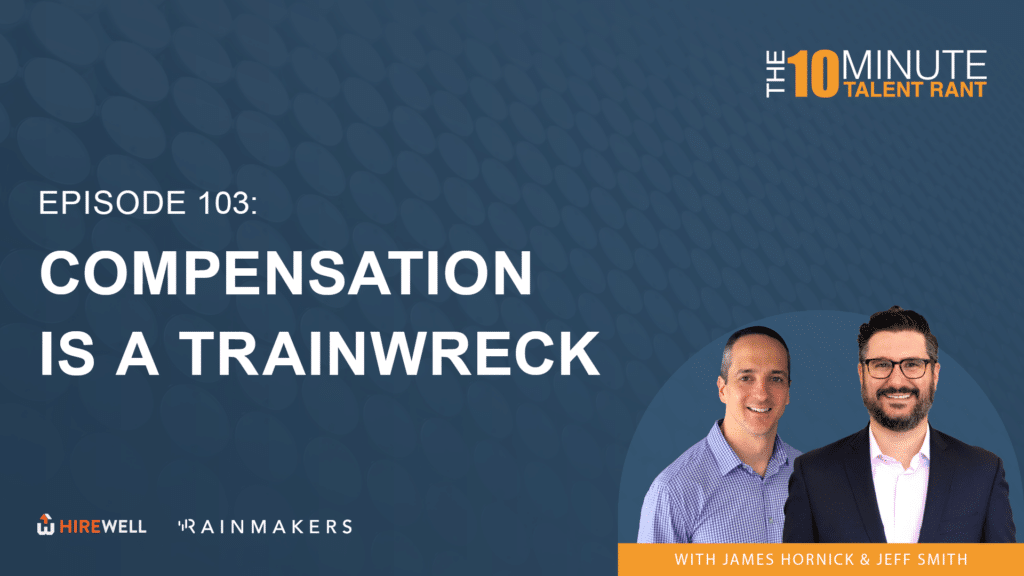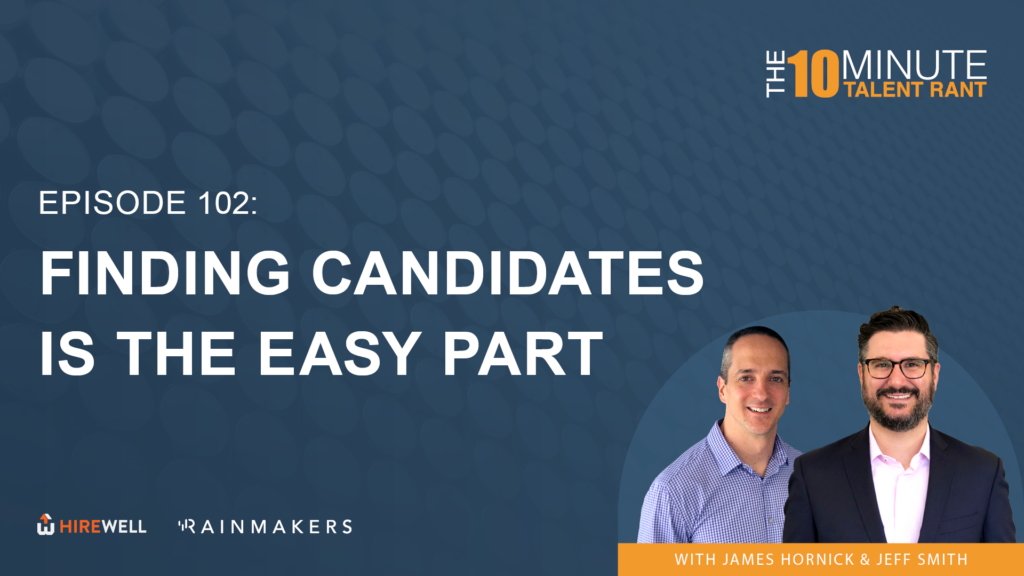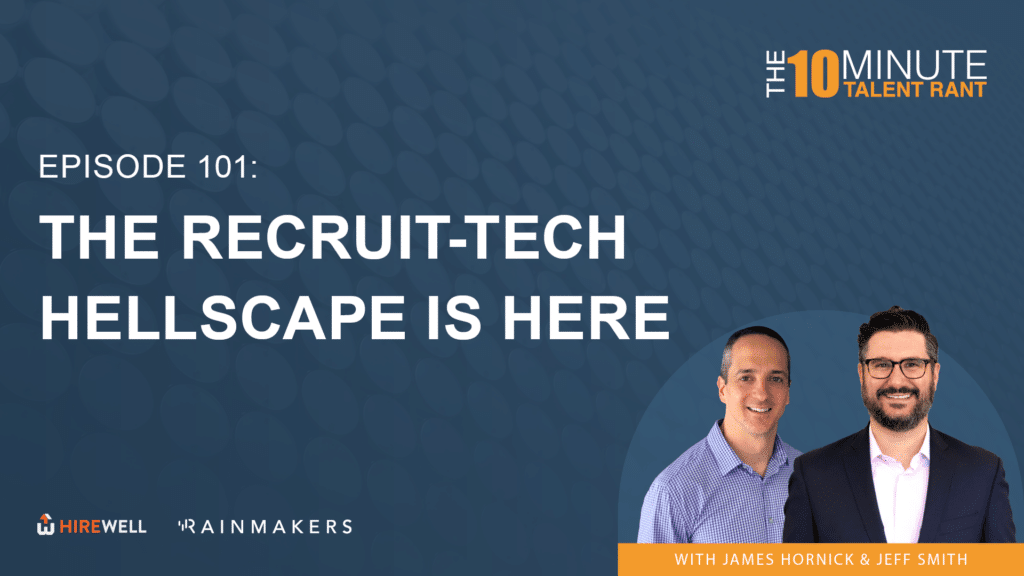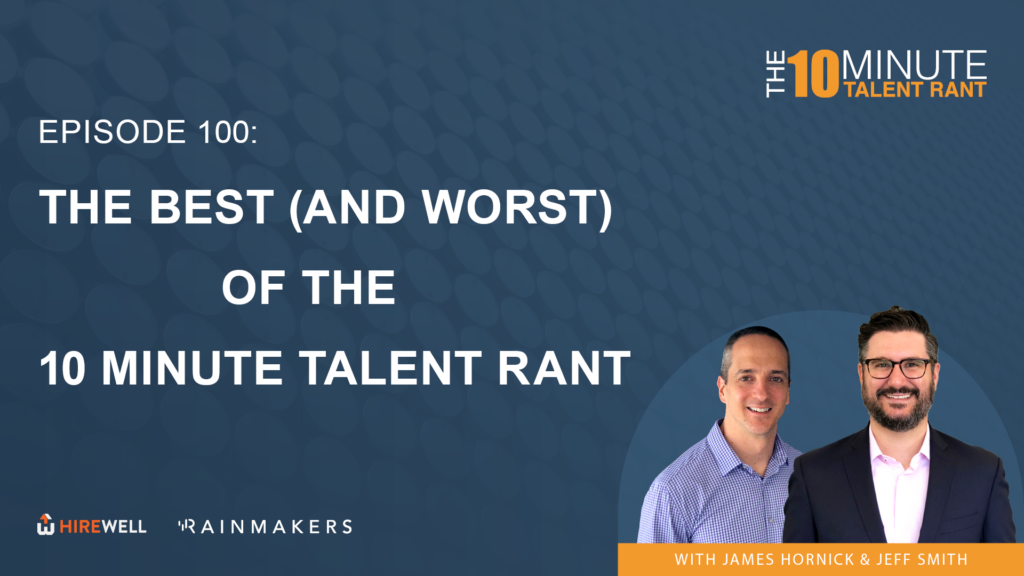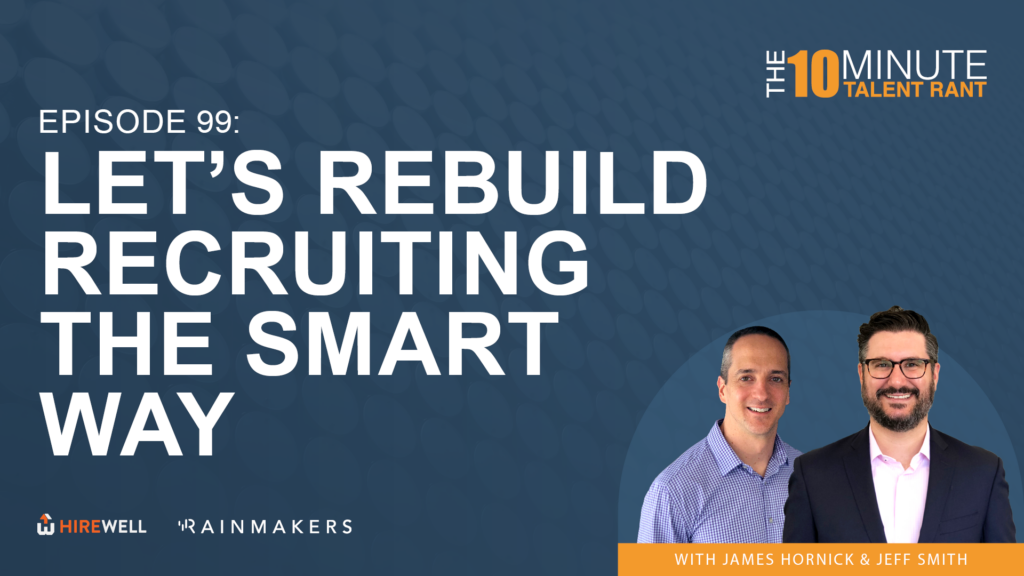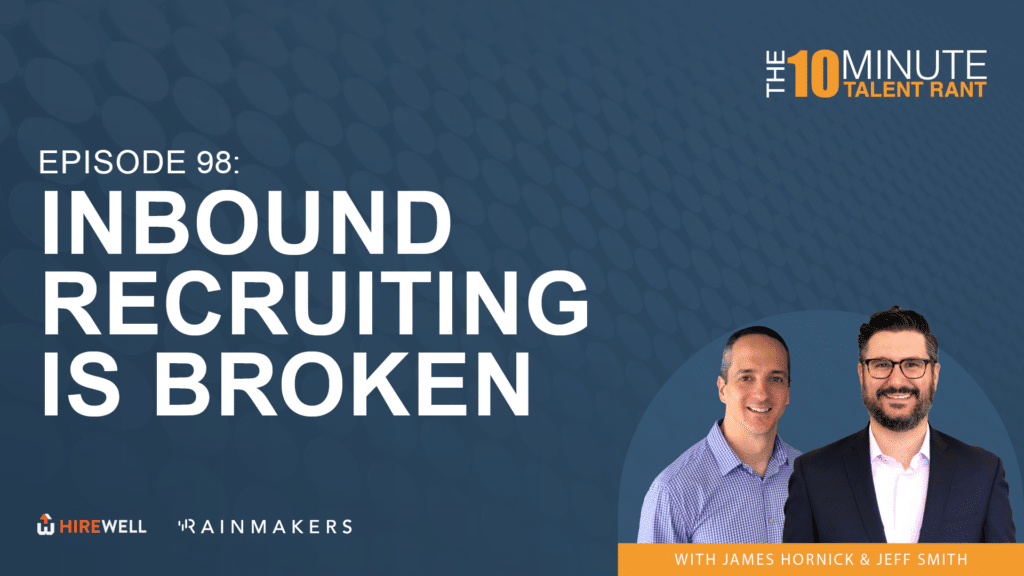The 10 Minute Talent Rant is live. I’m James Hornick, joined by Jeff Smith, and we are on the clock. The 10 Minute Talent Rant is our ongoing series, where we break down things that are broken in the talent acquisition and hiring space, maybe even pitch a solution or two. Before we dig in, all of our content can be found at talentinsights.hirewell.com.
Jeff, I feel like I’m a little out of practice. We’re like one week behind because of your vacation. So I know you’re refreshed, but I feel like I’m all thumbs over here. I feel very, yes, I feel very fresh. I will take the reins for you. This week’s topic, Episode 83, Dumb Hiring Ideas Are Back, Baby!
Yeah, they are. So hot. So hot right now! Yeah. All right. So, here’s why I think things are coming back. We were looking at like our data and stats. And, I’ve talked to a lot of people kind of in the external recruiting space and internal recruiting space. I think it’s a bit of a slow thaw. We’re not back to like rampant hiring, but things have improved, I think.
I mean, our, we’re looking at our own numbers. Our pipeline is about 65% larger than it was at any point the last half of last year. 88% of our new agreements so far this year have been retained agreements, meaning companies actually need the help and are ready to commit to it. January was our best month in over a year.
February looked very close. And I, kind of, like when hiring picks up, you know what else picks up, gave this away in the title, all the dumb things that come with it. Yeah, so I’m excited. And all the recruiters who complain about nonstop on LinkedIn. So yeah, what would the feed be without everyone either b*tching about recruiters or recruiters b*tching about hiring managers?
Yeah, and it’s all going to be the recycled takes from two years ago. It’s wonderful. Yep. So what we want to do is a little bit different though. We’re going to run through, Jeff is going to give you a little bit of a backdrop on kind of how we’re getting ahead of these issues and how people should, but we’re also going to run through probably the seven things.
I predict we’re going to see the most of, but we’re also going to have, I guess, resolutions or fixes for each one. So we’re not just bitching. We’re actually solving. So, but Jeff, why don’t you, why don’t you lead us off here with kind of a backdrop, we could have done a 42 minute talent rant with lots of content, but we’ve condensed it down to six.
Or seven. Whatever the number is. Here’s what we’re trying to do to stop the dumb. We have a big emphasis in 2024 to, we have a lot of this strategic muscle that we’ve already had internally that has been expended just through transactional search. I mean, it’s the core of our business and we’re just trying to flex that a little bit more.
If you look back at the pandemic, like everything that’s happened over the last four years. We’ve had three distinct evolutions, so you’ve got like the early pandemic landscape where, oh my gosh, we collectively needed to start hiring again, but everything is remote, like WTF, what do we do? Ahhh! You know, like the pants on fire.
We had mid pandemic where the fire started, it started getting, you know, it got really going, can’t hire fast enough. You know, James mentioned it above and so it was like this, this giant arms race. Then, you know, you’ve got kind of those last like 16 to 20 months where everyone was like, “Oh shit.”
Like we overpaid, you know, we have to cut people. People are bailing. No one’s happy, you know? And frankly, we, or y’all companies are terrified of paying more fees on top of it, which is creating this visceral reaction to just be like armed length of spending any more money on that. I think the point of this is all three of those scenarios required completely separate strategies.
So, in 4 years. Yeah. And an immense amount of change in that amount of time. So you pile on the fact that most of the internal teams that had all the legacy knowledge to begin with were decimated during phase three, you have this massive void on how things should strategically be rebuilt. We want to help with that.
Like, this is the goal of what we’re trying to do. Companies are going to need to tinker with processes and strategies, philosophies in perpetuity now. And this is where we want to step in. We don’t want to step in at the point of you have an open role. We can. But rather, we’d want to diagnose, like, what is passed to that band aid, right?
Like, what’s happening prior to things. If you’re not diagnosing how the role was opened in the 1st place and replicating that process at scale across the organization, you’re just going to keep paying us those fees. You know, in single transactions or bulk transactions without figuring out the why.
This is why our advisory services make a lot of sense. The TLDR, in other words, if your organization suddenly thinks that we’re going to go back to “normal times” before the pandemic, and that the dumb shit we’re going to talk about next is going to fly, we have really bad news for you. Yeah, it’s not smart.
So *drumroll*
Kick us off, Jeff. The top six list of dumb things that, we were actually, we were both laughing and crying about. Number one, that hiring manager who doesn’t give feedback, not on resumes, not on interviews, literally just behaves like you don’t exist. Love those. They’re my favorite. Best. We shouldn’t have to explain why not communicating with your internal recruiter or agency recruiter is really, really dumb.
But it’s number one on the list for a reason. Secondly, the lack of communication is really, really detrimental to the momentum with solid candidates. Like, nothing says I’m not that into you more than silence. Yeah. The fix here, if you’re so actually here’s the fix if you’re a recruiter, you need to be setting process and communication expectations with your internal stakeholder or your client, you know, whichever it is, and explain to them like why it’s in their best interest to give you this feedback.
As crazy and simple as that sounds, I know it’s hard. See, I’ve talked to internal recruiters before, like it seems hard for them to make these kinds of changes, but you just can’t let your colleagues walk all over you. And if you’re an agency recruiter, like you have to be setting these expectations up at the onset.
This can’t be something like you like talk about later in the process when you’ve already realized that they’re kind of doing their own thing. So it’s really incumbent that like, it’s a proactive thing you discuss, like, you know, how it has to go down. Well, and it parlays into point number two, right?
This is why internal recruiters sometimes can’t have those conversations. Yeah. So, number two. That HR leader who tells you they’ll only hire your candidate if they strike out on their own because your fee is getting in the way. So, nothing-
There’s nothing like double work! There’s nothing quite- encapsulates the dumbassery of recruiting more than holding external candidates from a firm to a higher standard than your own internal candidates.
Like, seriously, what the f*ck? How has this been a thing that’s been happening for so long? Partners, and I use that term extremely loosely in this scenario, shouldn’t see each other as competition. That kind of defeats the entire purpose. If that happens, you need to stop working with each other. Like, both sides.
Like, stop it. The fix, look-
the fix is a realization more than a fix. It’s like, there’s going to be, OG, might not even be the right- there’s just certain HR people, personas who, they’re just never going to get away from this way of thinking or realize how broken and detrimental it is to their own internal process.
So, like, we can only control our side of it. So, our advice to external recruiters is maybe you shouldn’t put in the countless hours of work into a search without understanding if they actually needed you. Like that’s a self reflective thing that you’ve got to like, be able to stomach. Yeah. Or, yeah, we’re going to get into this later.
Just don’t work on a contingent basis to begin with. Like, if you can’t make, yeah, if you can’t make headway with folks during a level headed discussion, like the fix is not working with them and focusing your energy on truly retained partners. It’s as simple as that. Number three, the internal recruiter who passed on your candidate for not having X, Y, Z skill, even if it’s right there on the resume.
So we’ve talked about this in other rants. Resume writing is not a perfect science for evaluating people. The subjectivity is rampant as everybody sees in the LinkedIn feed talks about this at length. The very best workers, ironically, often have the lousiest resumes, because they haven’t had to keep it up.
Like, there’s been no use to keep their resume up. Yeah. So the fix, this is a crazy idea here, Jeff. Create a process where there is an open dialogue to address ruled out candidates live with a conversation and not work entirely over email. Love how, I love when people talk to each other. Yeah, it’s wild.
We’ve made a big push, and I’m talking seriously here at Hirewell, go through our submitted candidates live with our customers and not just wait for email feedback and finding out about the bad news later. It’s made a huge impact on how folks move through the process objections and questions are handled real time.
Both sides can actually get past perceptions and false perceptions and get to the actual real deal behind like why these candidates are good where we actually missed the mark as opposed to just things getting constantly lost in translation, buried in emails, and like, we’re trying to evaluate talent, not just get through a task list as fast as possible.
When you think about it from that lens, it actually takes wide conversation to get there. Yeah, this is how resentment festers. That scenario specifically. All right, number four. That executive keeps changing requirements because they’ve never hired before, so they keep making up the process as they go along.
Well, I know everyone’s seen this a lot, internal and external recruiters, but, I mean, the workflow is like this, a recruiter sends a candidate, executive has more asks over and over again, sent more candidates, more asks, meanwhile, you’ve got dozens of candidates who have heard about your company on the hook, wondering like, who are these people?
Are they jokers? It’s been weeks. They said they’re interested. I still haven’t heard anything back definitive either way. You’re not the perception you want to have about your company. You’re trying to get things going and getting word of mouth in the market. And we have sympathy for hiring managers who are caught in the middle of this, by the way, who are well intended, but then somebody from on top says, no, no, no, this is what we want to do.
The fix here is we, as external recruiters, need to not fall into order taker mode. You cannot do that. It is a recipe for disaster. You have to think about building credibility needed to it, to build the credibility so that you are. Positioned to advise them on best practices, which is exactly going back to our advisory.
Exactly the point of where we want our inception point to be. Frankly, they should appreciate it, especially in a retained situation. You know, somebody is going to put money and skin in the game. It would only make sense that they would want a little bit of that pushback, but yeah. Number five the, gosh, the good old tried and true and we hear we only work with contingent firms.
And then, you know, my, our, next question is why? The answer is because our current contingent firms stink. Okay. I love it. Okay, dude, or dudette, like, we’re probably not the right fit. Yeah. And so it’s like they’ve got like six firms they’re working with. None of them can find, you know, maybe what’s the root cause of why all these firms are terrible.
I don’t know. But then the other sometimes, you know, the fix is or they look at that or they like decide, “Hey, we’re just going to hire an internal recruiters only to kind of do this.” And, but usually what that ends up coming down to is they realize. You know, we’re going to try to hire these 200 roles with one single mid level internal recruiter that we’re paying 80k to, and that’s going to stomp out all the recruitment fees we’re going to place.
Plot twist, it’s not going to do that. They’re going to be really happy in that job, by the way, too, and not be looking. I mean, this is one where if someone can’t put the basic cause and effect of working with a ton of firms at the same time and none of them producing, together, like, this is just not-
just move on.
This is not, these people are not serious partners. They’re not serious people. They’re not serious people. I miss that show. Last one. This is an example, like, number 6, we want a woman in her 30s or 40s or person of color or person that fits a profile or person who was in a fraternity or whatever it is. I don’t know where to start.
We’re hearing it again, too. Like, it makes me want to like, jump off a bridge
Any kind of profiling as a necessary requirement for the role- oh, my God. And it still happens- yeah, it accentuates number one, it accentuates everything it is the dumbest thing you could possibly do. And two, if you missed, if you’re not on Twitter, X, whatever we’re calling it, the EEOC commissioner came out and said, again, it’s illegal.
You shouldn’t have to have someone from the government who’s in charge of this stuff telling you that profiling is illegal, but it is. We are short on clock. That’s a wrap for this week. Thanks for tuning in the 10 Minute Talent Rant part of the Talent Insights series, which is always available for replay on talentinsights.hirewell.com as well as YouTube, Apple Podcasts, Google Podcasts, Spotify, and Amazon. Jeff, thanks again as always. Everyone out there, we will see you soon.







